|
|
|
Sort Order |
|
|
|
Items / Page
|
|
|
|
|
|
|
| Srl | Item |
| 1 |
ID:
158642
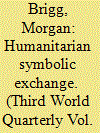

|
|
|
|
|
| Summary/Abstract |
Moral common sense frames the relationship between privileged and at-risk populations underpinning contemporary Responsibility to Protect (R2P) discourse. This article develops an alternative by considering the relationship between archetypes of would-be rescuers and victims through Jean Baudrillard’s theorisation of symbolic exchange. Baudrillardian analysis connects personal morality and affective intersubjective symbolic exchange with the politics of international order. This leads, first, to an argument that current foundations for advocating R2P risk participating in a problematic moral economy of symbolic exchange between would-be rescuers and victims. Nonetheless, and secondly, the article deploys symbolic exchange to develop suggestions for partially re-figuring R2P’s humanitarian impulse by engaging ‘locally’ – both through one’s self (in the ethical relation suggested by Emmanuel Levinas) and with diverse forms of political order (following Jacques Rancière’s conception of politics). Doing so supports moves to engage a wide array of individual actors in a more interactive and less hierarchical form of R2P, to drive deeper consideration of local complexities of R2P through engagement with diverse local forms of political order, and to develop a more inclusive understanding of ‘humanity’ in order to bolster R2P’s normative foundations.
|
|
|
|
|
|
|
|
|
|
|
|
|
|
|
|
| 2 |
ID:
106665
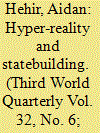

|
|
|
|
|
| Publication |
2011.
|
| Summary/Abstract |
A characteristic feature of many contemporary international administrations of post-conflict territories has been the reluctance of the administrating body to rescind its competences. International administrations have legitimatised their maintenance of key competences on the basis that the societies they administer have yet to achieve stipulated benchmarks indicative of a capacity for complete self-government. This paper offers a post-structuralist analysis of the unwillingness of international administrations to cede control to local institutions and draws in particular on Jean Baudrillard's theory of hyper-reality. Baudrillard identified the means by which, as part of a process of self-identification, a simulated world has come to replace reality and our perception of things has become corrupted by a perception of a reality that never existed. Thus entities and phenomena are imbued with characteristics they do not and cannot have, yet are treated as though they do. In the context of statebuilding this has been manifest in the desire to create political communities which mirror an idealised and unreal vision of the Western state.
|
|
|
|
|
|
|
|
|
|
|
|
|
|
|
|
| 3 |
ID:
123054
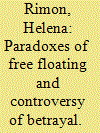

|
|
|
|
|
| Publication |
2013.
|
| Summary/Abstract |
Throughout the 1900s, intellectuals have been defined as a "privileged minority" (according to Chomsky), or as outsiders, whose "free floating" condition (Mannheim) guarantees their functioning as "custodians of values like reason and justice" (Hofstadter). Julien Benda accused intellectuals of betraying this mission. But, perhaps, betrayal is built into the very nature of their privileged position; perhaps, by pretending to be "free floating," generations of intellectuals have actually been constructing predictable paradigms, using calamity as a new kind of raw material for the old myth of lucrimax (Etkind). The tragic experience of Russian intellectuals provides us with fresh insight for this discussion.
|
|
|
|
|
|
|
|
|
|
|
|
|
|
|
|
| 4 |
ID:
124914
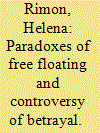

|
|
|
|
|
| Publication |
2013.
|
| Summary/Abstract |
Throughout the 1900s, intellectuals have been defined as a "privileged minority" (according to Chomsky), or as outsiders, whose "free floating" condition (Mannheim) guarantees their functioning as "custodians of values like reason and justice" (Hofstadter). Julien Benda accused intellectuals of betraying this mission. But, perhaps, betrayal is built into the very nature of their privileged position; perhaps, by pretending to be "free floating," generations of intellectuals have actually been constructing predictable paradigms, using calamity as a new kind of raw material for the old myth of lucrimax (Etkind). The tragic experience of Russian intellectuals provides us with fresh insight for this discussion.
|
|
|
|
|
|
|
|
|
|
|
|
|
|
|
|
| 5 |
ID:
141195


|
|
|
|
|
| Summary/Abstract |
Against a surprising level of agreement between Clausewitz, contemporary military doctrines and critical war studies on an ontology of war as fighting, we suggest that the study of contemporary warfare needs to focus more on war as processing. Through Jean Baudrillard we argue that at least some of what is referred to as ‘war’ is no longer characterised by encounters through fighting. We exemplify our argument by how the repetitive battle-rhythm of military targeting strives for perfect war. What remains is not war as an object in itself, but a reified ‘war’ that obscures the disappearance of that very object. The debate on war contributes to the reification of such a war, as an imperative telling us: ‘we have a concept, you must learn to think through it’.
|
|
|
|
|
|
|
|
|
|
|
|
|
|
|
|
| 6 |
ID:
145974
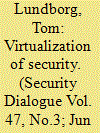

|
|
|
|
|
| Summary/Abstract |
During the last couple of decades, the virtual has emerged as a forceful conceptual tool in security studies. While used primarily in order to question assumptions about an objective truth concerning the meaning and value of security and different forms of insecurity, the implications of drawing on this concept vary considerably depending on how the virtual is conceptualized, and specifically how the potentiality of the virtual is linked to the process of actualization. Turning to the philosophies of Baudrillard, Agamben and Deleuze, as well as key thinkers in contemporary security studies, this article delineates three different approaches to analysing the virtualization of security. Focusing in particular on how these approaches point to contending views of ‘capture’ and ‘resistance’, it is argued that the choice of approach has serious implications for grasping what is at stake politically in the process of virtualization. These implications relate, more precisely, to how the virtual opens up and/or closes down the spaces of resistance that the modern subject of security traditionally has relied upon. In this way, the virtualization of security not only is important for thinking about capture and resistance, but challenges the very ground on which the modern subject of security rests.
|
|
|
|
|
|
|
|
|
|
|
|
|
|
|
|
|
|
|
|
|